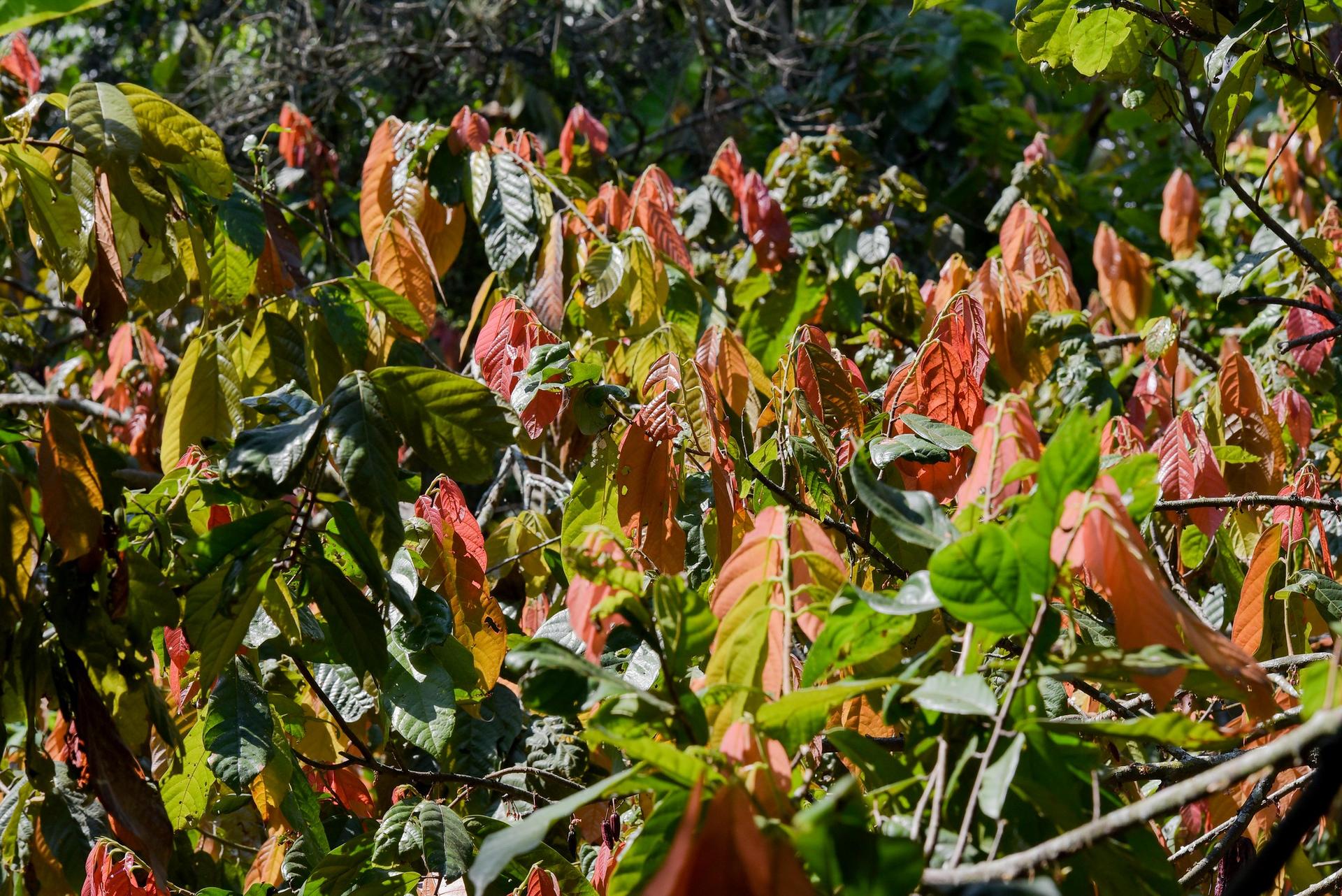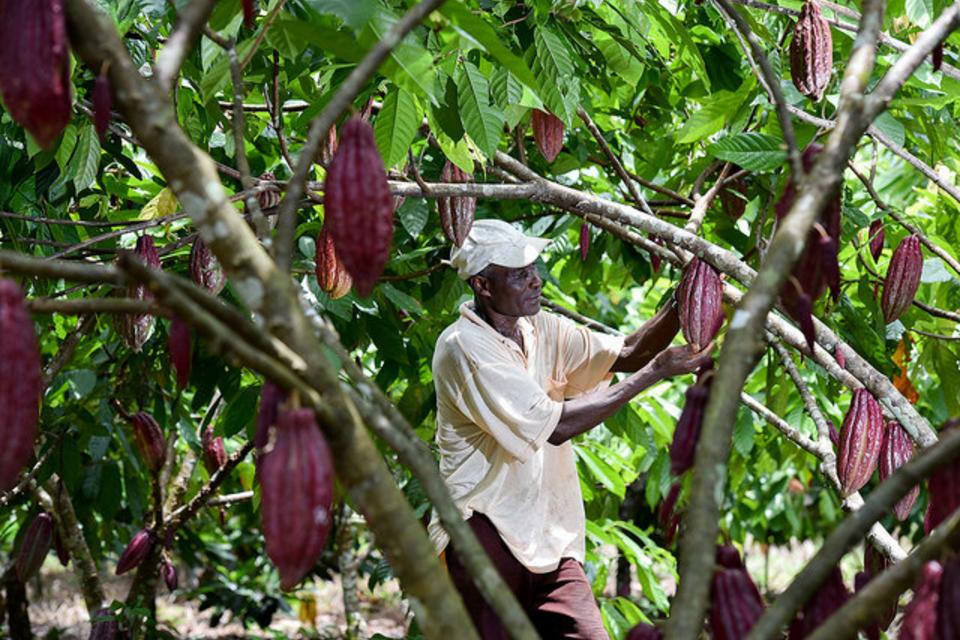Collaborative Framework for Cacao Evaluation

Seeking High Temperature and Drought Tolerance in Cacao. A Knowledge Sharing Platform
An integrated approach to improving yield efficiency and resilience in the face of climate change through better use of cacao genetic resources.
Platform Rationale
To meet demand, cocoa and chocolate producers require sufficient consistent and reliable supplies of quality cocoa beans. Globally, 40-50 million people depend on cocoa for their livelihoods. There are between 5 and 6 million cocoa farmers worldwide, who in 2016 produced around 4.7 million Tons of cocoa beans with a gross production value of US$4.6 billion (FAOSTAT). Despite this, most cocoa farmers live beneath the poverty line, on an income of less than US$2 per day. Beyond global price fluctuations, climate change poses a suite of new challenges, where rising temperatures, flooding, longer and more intense droughts and fluctuating weather patterns combine with increasing soil erosion to threaten cacao farmers' livelihoods and associated value chains.
Despite the seriousness and global reach of these threats, the world lacks a set of common, shared approaches and protocols to address them. Nor is there yet a common databank where different partners can upload their information to validate a wider analysis on cacao planting and soil characteristics and their interaction with climatic data.
Plants are adapting to climate change in different ways, each requiring different methods and means of measurement, for example, some coping mechanisms that involve plant organs can be measured by the minute, whilst other traits like yield or tree/crop canopy characteristics take longer to be measured. Furthermore measurement units often differ within and between fields, platforms or in the labs.
The physiological basis of climate resilience in cocoa is under-explored and international collaboration is essential to ensuring sustained cocoa productivity and quality in a changing climate. In the medium-term, unless we act now, there are likely to be at least a million cocoa-dependent livelihoods adversely affected by climate change. Cocoa diversity needs more extensive characterization for resilience to abiotic stresses.
This Knowledge Platform will highlight some of the initiative that are addressing these challenges as:
- the belove-mentioned Collaborative Framework for Cacao Evaluation - Climate Change (CFCE-CC) project,
- World Cocoa Foundation’s Feed the Future Partnership for Climate Smart Cocoa,
- a CCAFS - funded project led by CIAT Mainstreaming climate-smart practices in cocoa production in Ghana,
- Bioversity’s Dutch-funded cacao project in Ghana: CocoaTarget to improve climatic and agro-ecological targeting of cacao varietal recommendations, and
- University of Reading’s project The development of a platform for climate change research in cocoa, funded by Cocoa Research UK.
Efforts are needed to upscale research efforts for global impact. There are many inconsistencies between fields, controlled conditions sensors, units, and terminology, that all need to be harmonised.
This platform aims to foster shared strategies for addressing climate-change threats to farmer livelihoods and ecosystems in cocoa-growing regions. It is a dynamic platform that will improve according to the quality of inputs.
Platform Goal and Content
This Platform aims to be a space where multi-country cacao climate-resilience work is mapped and where different stakeholders, ranging from international research organizations, to the private sector can find and contribute to information and discussions regarding the status quo of the topic.
The long-term goal is to increase sustainability and resilience of cocoa productivity and quality by facilitating optimal use of genetic diversity in development of improved, diverse and locally-adapted cocoa varieties. This will be achieved through:
- Getting a clear understanding of the current knowledge on the physiological responses of cocoa and the genetic diversity to drought and high temperature.
- Mapping out the institutional landscape and partnerships on cocoa drought and high temperature tolerance research.
- Developing a pragmatic framework for research programs and related priorities for the next five to ten years.
Platform areas
Preliminary Review on Research on Cacao and Drought
Starting point: a comprehensive review of research on the effect of Climate Change on Cocoa
This report presents the global status of research on the effects of drought, temperature and elevated carbon dioxide (CO2) levels on the cacao plant, and the role of genetic diversity in producing more resilient cacao.
Toward a standardization of Protocols and Trait Collection
Via partner consultations, and especially with the support of The University of Reading (UoR), the CFCE-CC team produced a rationalized list of traits, together with a list of specific equipment for standard measurement. This is extremely useful to help ensure standardization and consistency of terminology in any future work.
The Collaborative Framework for the Cacao Evaluation Project
The Evolution of the Collaborative Framework for Cacao Evaluation on Climate Change (CFCE-CC)
Back in 2016, the ECA/CAOBISCO/FCC and WCF formulated the original objective of:
Developing a research programme to identify climate-resilient cacao materials that could be fast-tracked for use in breeding programmes.
Climate Smart Cocoa Programme
World Cocoa Foundation’s Latin American Country Climate Smart Cocoa Programme
In relation to the CFCE project, it's worth mentioning WCF's Climate Smart Cocoa Program. It works in key LAC producer countries and aims to develop a common strategy and clear investment pathways to increase industry engagement and investments in climate smart agriculture (CSA). The Program focuses on knowledge development and cross-learning.
The Status of Research in the Field
Côte d'Ivoire: CNRA (Centre national de recherches agronomiques)
With a record production of 2.010 Million tons of marketable cocoa beans produced in 2016-2017 (ICCO, 2017), Ivory Coast cocoa farming covers an area of more than 2 176 000 hectares ( 6% of the national territory) and with more than one million farmers. In addition, cocoa generates more than 30% of export earnings and accounts for more than 15% of Ivorian GDP.
Cacao and Drought Debate Material
Overview of Cacao Physiology and Cacao Climate Resilience
In the context of the CFCE project, Philippe Bastide provided in the downloadable presentation and overview of cacao physiology and cacao climate resilience, citing the available range of production system options, including:
- Light shade, windbreaks and cover crops;
- Temporary shade with banana and Gliricidia;




